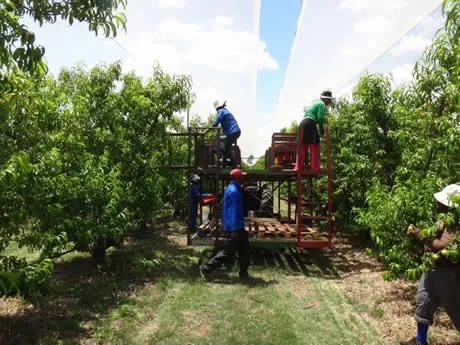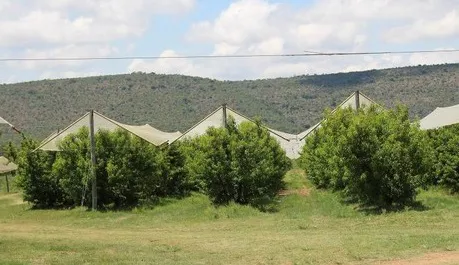The organic peach and nectarine season has just started at Pro-Plum, part of the OrganoGroup, on the Waterberg highlands of Limpopo Province, flown out to primarily Canada and Europe, with some smaller volumes to the Middle East.
 Organic stonefruit harvesting at Pro-Plum, in Limpopo, South Africa (Photo courtesy of OTC Organics)
Organic stonefruit harvesting at Pro-Plum, in Limpopo, South Africa (Photo courtesy of OTC Organics)
“The organic category is growing by double digits every year in Europe and this time of the year, we’re the only producer of organic stonefruit in the world,” says Paul Roos, director of Pro-Plum, “but we didn’t start doing this with a marketing window in mind. We started doing this because we were looking at producing a product with better eating quality. When my children were growing up, they could pick any fruit in the orchard and eat it right away. That’s what we wanted and it has become our philosophy and lifestyle.”
In fact, he continues, their vision is: "organic products in every household", and with that in mind they’ve been expanding into organic vegetable production, partly in response to a request by a local retailer. They will soon launch a range of product lines like Organo-Kidz, 800g bags of organic stonefruit, for both the local and European market, as well as Organo-Spot, organic sweet potato.
The company has been organically certified for 15 years, producing nectarines, peaches, plums, apricots, nectacots and, later in the season, apples. Canada takes the majority of their fruit where they service large supermarket programmes through OTC Canada, while in Europe they’re present on the wholesale market and in supermarkets, represented by OTC Holland.
In Europe Germany and Scandinavia are major markets for them, as well as Switzerland, France and the UK. Their stonefruit season extends until shortly before Christmas while their organic apples run until the end of January. With the European stonefruit market emptying earlier, and some concern around the quality of stored apple stocks after a hot summer, it looks to be a good export season.

Successful trials on organic lemons
For years they’ve been trialling organic Eureka lemons, which is a line for which they foresee big potential, and they’re set to embark on commercial plantings.
“Everyone asks me whether we’re going to look at seedless lemons, but from my point of view, the seedless lemon hasn’t been tested in our area and Eureka is still working in our market. While we’re early on stonefruit, this area is very late on lemons. We’ll come in around July and August and demand for organic lemons is large during this period."
Organic production starts and ends with orchard sanitation
Stonefruit and apple production at Pro-Plum has to a very large degree been made possible by low chill cultivars developed by the South African Agricultural Research Council (ARC). Paul recounts how a couple of years ago ARC researchers wanted to investigate post-harvest decay of their organic fruit, but had to learn that they experience nothing of the sort. “Sanitation in our orchards is of cardinal importance. I have a team that moves through the orchards, picking up fallen fruit, and they are followed by another team to make double sure. When I find a fossilised fruit in the orchard, I am not happy.”
“We act pro-actively and constantly walk through our orchards. With organic production you can’t afford for a problem to develop, you have to pick it up as soon as it starts. We place the usual pheromone traps for false codling moth, for instance, but from this year we’ve started using a virus that attacks the larvae. Many of the biological control products we use come from Holland.”
They employ a whole basket of methods, like compost made with chicken manure from poultry never fed hormones or antibiotics, earth worm extract, compost teas, gram positive bacteria, fish emulsion, even malic acid they make themselves from their sub-standard apples for use as herbicide.
In terms of value, approximately 80% of their orchards are under netting to protect against hail. This season, for the first time ever, they experienced cold damage on their apple blossoms. “It’s not a disaster, but it just shows you: when it starts heating up in August people tend to think winter is over, but this year we got two late cold spells.”
“As a farmer there is a raft of problems that you have to negotiate to get that product on the table, and consumers aren’t always aware of everything that comes our way, often things we have no control over, like cold damage or hail. But when you see and taste the product, it makes it all worthwhile.”
For more information:![]() Paul Roos
Paul Roos
Pro-Plum (OrganoGroup)
Tel: +27 81 464 2482 / +27 82 493 1882
Email: ontvangs@proplum.co.za
